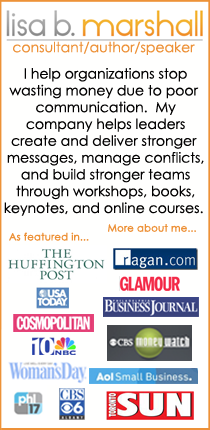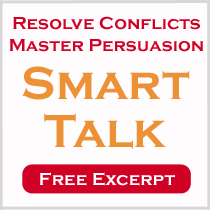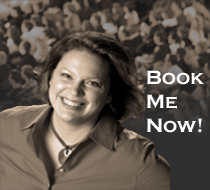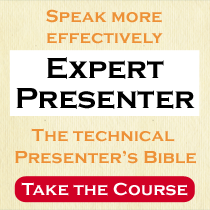Questions for Lisa B
Hello,
Thanks for the invitation and opportunity to work with us.
Below you will find possible questions for Lisa B. Marshall drawn from her bestselling book, Smart Talk, and from her award-winning podcasts, The Public Speaker and Smart Talk. These are provided to help your host appear as if they familiar with her work. Feel free to use them or not. In addition, Lisa is often asked for recommendations, they are included below as well.
If you create your own questions, Lisa prefers to receive them at least 24 hours in advance. Please let us know your plans.
Team Lisa B. Marshall
INTERVIEW QUESTIONS FOR LISA:
From her bestselling book Smart Talk:
The book covers the following topics: self-introductions, conversation making, following-up, business diplomacy, feedback, criticism, difficult conversations, difficult people, saying no, persuasion, negotiation, positive language, and inner charisma.
General/Starter
- Were you always a “smart talker”? Why did you choose to write Smart Talk?
- What are the most common communication obstacles?
- How do you define “smart talk”?
Taking the hell out of hello! Self-Introductions / Conversation-making
- Why are introductions so important?
- What is the best way to introduce yourself?
- We seem to meet more and more people on line first, are online introductions different?
From Archie Bunker to Mary Poppins? How to speak with tact and grace
- What is business diplomacy (how is it different from being a kiss ass?)
- Are there any rules we can follow to be more diplomatic?
- How exactly can you be more diplomatic?
The “F” Word: How to Deliver Restorative Feedback
- Nobody likes criticism, why bother with feedback?
- What exactly is “restorative feedback”?
- You say that the old “feedback sandwich” – something positive, then the criticism, then something positive again – doesn’t work, then how exactly do you deliver feedback?
- What about delivering feedback when it is a really sensitive difficult conversation…is there anything different you need to do?
Ouch that Hurts” How to Accept Criticism
- So many people are critical and negative—shouldn’t we just ignore all that and keep on marching forward?
- How do you deal with criticism in a positive manner?
Influence to Maximize Impact
- Many successful people want to say to say “yes” to as much as we can, but you suggest that was “say no more”… Why is that?
- Can you give me a model for saying “no” in a way that doesn’t hurt the relationship?
- If I want to persuade someone, what are some things we can do to increase our chances?
- What are the six principles of influence?
From her bestselling book Ace Your Interview:
The book covers the following topics: how to project a powerful online image, how to become an interview insider, a step-by-step process to create and refine targeted messages, how to respond to the tough questions, how to respond to behavior questions, how to handle the telephone interview, and creating a powerful first impression.
- What makes this interview preparation book different?
- What are some of the newer strategies that can make candidates stand out from the crowd?
- How do a candidate prepare so that he/she becomes an “interview insider”?
- In your book you refer to a career accomplishments, goals and experiences (CAGE) document–what exactly is that and how is it different from a resume?
- Can you describe your process for creating and refining targeted interview responses?
- You refer to a Professionally Asked and Answered Questions (PAAQ) document–what is that and why do you need to prepare one of these?
- For interviews what is the difference between being “rehearsed” and “prepared”?
- Every interview includes a form of “Tell me about yourself” — what is the best approach to answer that question?
- What is the best approach to answering behaviors questions besides using “STAR”?
- Telephone/skype interviews are becoming more and more important. What are common phone interview mistakes and how do you avoid them?
- First impressions are critical –particularly when you are interviewing. Can you give us some guidelines for creating the best first impression?
- What are common mistakes when it comes to the job offer?
From her award-winning podcast, Public Speaker:
This tips-based podcast covers a wide variety of topics. The questions below are some of the most commonly asked questions (that are not covered in her book, Smart Talk). There are over 325 episodes of the Public Speaker, if you want to discuss a particular episode, please let Lisa know in advance so that she can review.
- For many people, public speaking makes them nervous or at least uncomfortable, can you offer us some tips to help people calm their nerves before speaking?
- Many of us, at one time or another, need to introduce another speaker. Can you give us some tips for making a great speaker introduction?
- What are some ways that we can add a bit of humor to our speeches?
- Many of us don’t speak as clearly as we could. Do you have any tips to help us stop mumbling and project our voices?
- Who interrupts more? How do you diplomatically handle someone that constantly interrupts?
- Awkward silence in a conversation is well…awkward. Do you have any tips to help us avoid that?
- I’ve read that you suggest that talking to strangers is good for your health. Don’t most people prefer to just keep to themselves?
- We all know that first impressions are important. Can you tell us how to fix a bad first impression?
From her podcast, Smart Talk:
This interview-based podcast covers a wide variety of topics in leadership, communication, and management. The premise of the podcast is that when we model the mindsets, the principles, and actions of successful people it allow us to unleash or amplify the leader is all of us. There are over 70 interviews, if you want to discuss a particular interview, please let Lisa know in advance so she can review.
- Can you tell us about gender bias? Is this still an issue in our current workforce?
- When it comes to workplace productivity, can you share the 3 most important tips you’ve learned from you productivity guests?
- Can you tell us more about the research from Harvard professor Francesca Gino, on how our decisions get derailed and some ideas to help us stick to our plans?
- You interviewed NY Times best selling author, Adam Grant. He writes that people who give without expecting in return are often the most successful people in any given field. Can you tell us more about this powerful concept?
From her career and life:
How would you define a “successful” career and what needs to happen for more women to achieve that level of success?
I can’t say it any better than Maya Angelou: “Success is liking yourself, liking what you do, and liking how you do it.” How do you get there? First, by having great parents that instill confidence and independence in you. Second, and perhaps most importantly, by having the courage to fail, pick yourself up, fail again, and keep going no matter what challenges face you. And finally by getting help from others!
What is your proudest career accomplishment and why?
The emails that I get from people who have read/listened and benefited from my books (Smart Talk<http://www.
Please describe a particularly challenging problem that you had to overcome in your career and the steps you took to overcome it.
I was told very, very early in my career that I “…was like a cruise liner coming into port. You rock all the other boats and don’t even realize it!”
(Turns out, that’s what happens when you have parents that encourage a strong, independent personality!)
I was horrified to learn that my professional relationships were suffering due to my interpersonal communication skills. Thankfully, I was sent to communication skills training, but that was just the start. I read everything there was to learn about better communication, eventually went back to school and earned a master’s degree in interpersonal and organizational communication. I started a business helping organizations and individuals express their ideas and much later started a podcast to help others learn ultra practical tips at the intersection of psychology, communication, and success. Then, because of the success of the podcast, I was asked to write a few books to help others communicate better to achieve their goals.
Funny thing is, there are days I still feel like that cruise liner–I’m still working on developing my communication skills!
If you could be mentored by anyone, who would it be and why?
I’d love to be mentored by someone that is 10 steps ahead of me, someone who has been mentored, who is looking to give back. I want to be mentored by someone who understands my business and is willing to freely share her/his knowledge and expertise and someone that would be willing to collaborate with me. I’m wish I knew who that was!
What advice would you give to your younger self?
Trust yourself more. Read more. Build more professional relationships. Working includes having fun and taking breaks! Oh, and don’t skate backwards on a uneven sidewalk–you’ll hurt your back! And practice your math more!
Do you have a motto or words that you live by?
I lost my first husband to terminal illness. I recognize life is short and we need to make the most of it. In the hallway outside of my bedroom door are the words: Live every moment. Laugh everyday. Love beyond words. I take those words seriously–but maybe I shouldn’t! (ha, ha)
INTERVIEW RECOMMENDATIONS FROM LISA:
Quotes that inspire Lisa:
Live. Laugh. Love.
(After losing a husband to terminal illness this is especially poignant for Lisa.)
Life is not measured by the number of breaths we take; but the number of moments that take our breath away. (This quote is in the stairwell of Lisa’s home.)
Book recommendations:
Non-Fiction:
Conversation Transformation – Ben Benjamin, Amy Yeager, Anita Simon (the content not the writing)
POP: Create the Perfect Pitch, title, and tagline for anything – Sam Horn (for those that are creatively challenged, this helps tremendously)
Give and Take – Adam Grant
Humble Inquiry – Edgar Schein
Fiction:
The Storyteller – Jodi Picoult (favorite of 2015)
Sycamore Row – John Grisham
The Girl on The Train – Paula Hawkins
The Next Best Thing – Jennifer Weiner
Productivity tips:
1. Do what you are least motivated to do first thing in the morning – your willpower breaks down as the day goes on, so take advantage of the morning
2. Ignore social media and turn off your email when working on projects
3. Hire someone to help you – take the leap – even if only for a few hours each week. It’s worth it!
Productivity tools she uses and saves time with:
1. Textexpander (Breevy on PC) should be incorporated to as many of your processes as possible
3. Calibre for convert text to epub to mobi
4. Evernote
5. If it would take more than 2 or 3 paragraphs of email she picks up the phone to talk!
6. Handle (integrated to do, calendar, and email)








